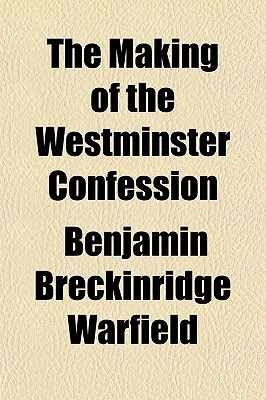- Bible
- Read the Bible
- Bible Versions
- Verse of the Day
- Reading Plans
- Verses by Topic
- Books of the Bible
- Bible Images
- Study
- Commentaries
- Concordances
- Dictionaries
- Encyclopedias
- Sermons
- Bible Atlas & Maps
- BP Wiki
- Devotionals
- Today's Devotionals
- Light of the World
- All Devotionals
- Inspirational Quotes
- More
- Picture Quotes
- Videos
- Inspirational
- Bible Study
- What The Bible Says
- Bible Q&As
- Daily Bread
- Bible by Genre
- Bible Stories
- Random Bible Verse
- Community
- Store
The Making of the Westminster Confession
by Benjamin B. Warfield
It is the purpose of this article to give as clear a view as possible of the process by which the Westminster Confession was made. In prosecuting this purpose two tasks present themselves. One concerns the modes of procedure of the Assembly in framing the Confession; the other the course of the debates by which it was beaten out. We shall attempt to give some account of both matters. The latter offers so wide a field, however, that we shall be constrained to deal with it by sample - and, for reasons which will readily suggest themselves at the present juncture, we shall select the third chapter of the Confession as the sample to be dealt with. We shall therefore try first to trace the formal procedure of the Assembly in framing the whole Confession, and to obtain some adequate conception of the labor and time that was expended on it; and then, taking up the third chapter, we shall essay to reconstruct as fully as may be a picture of the actual work of the Assembly in producing it.
The amount of time consumed directly on the preparation of the Confession of Faith was certainly very great. But even this does not completely represent the pains expended on this task. To estimate that fairly, there should also be taken into account the time and care given formally to other subjects, which yet necessarily conduced indirectly to the perfecting of the final statement of doctrine. Nearly all the labors of the body, from its coming together on July 1, 1643 till the completion of the Shorter Catechism on April 12, 1648, may without exaggeration be said to have had a doctrinal side; and much time was spent in direct doctrinal discussion. None of this discussion that was precedent to or contemporary with the formulation of the propositions incorporated into the Confession was lost labor with respect to it. There were in particular three or four of the tasks of the Assembly, however, which bore so immediately on its preparation for framing the Confession that they deserve especial mention in this connection.
The amount of time consumed directly on the preparation of the Confession of Faith was certainly very great. But even this does not completely represent the pains expended on this task. To estimate that fairly, there should also be taken into account the time and care given formally to other subjects, which yet necessarily conduced indirectly to the perfecting of the final statement of doctrine. Nearly all the labors of the body, from its coming together on July 1, 1643 till the completion of the Shorter Catechism on April 12, 1648, may without exaggeration be said to have had a doctrinal side; and much time was spent in direct doctrinal discussion. None of this discussion that was precedent to or contemporary with the formulation of the propositions incorporated into the Confession was lost labor with respect to it. There were in particular three or four of the tasks of the Assembly, however, which bore so immediately on its preparation for framing the Confession that they deserve especial mention in this connection.
BUY NOW
Paperback, 56 pages
Published January 10th 2010 by General Books
© 2025 Bibleportal.com All rights reserved.

Benjamin Breckinridge Warfield was professor of theology at Princeton Seminary from 1887 to 1921. Some conservative Presbyterians consider him to be the last of the great Princeton theologians before the split in 1929 that formed Westminster Seminary and the Orthodox Presbyterian Church.
Warfield entered Princeton University in 1868 and graduated in 1871 with high honors. Although Warfield studied mathematics and science in college, while traveling in Europe he decided to study theology, surprising even many of his closest friends. He entered Princeton Seminary in 1873, in order to train for ministry as a Presbyterian minister. He graduated in 1876. For a short time in 1876 he preached in Presbyterian churches in Concord, Kentucky and Dayton, Ohio as a "supply pastor". In late 1876 Warfield and his new wife moved to Germany where he studied under Ernst Luthardt and Franz Delitzsch. Warfield was the assistant pastor of First Presbyterian Church in Baltimore, Maryland for a short time. Then he became an instructor at Western Theological Seminary, which is now called Pittsburgh Theological Seminary. He was ordained on April 26, 1879.
During his tenure, his primary thrust (and that of the seminary) was an authoritative view of the Bible. This view was held in contrast to the emotionalism of the revival movements, the rationalism of higher criticism, and the heterodox teachings of various New religious movements that were emerging. The seminary held fast to the Reformed confessional tradition — that is, it faithfully followed the Westminster Confession of Faith.
Warfield's view of evolution may appear unusual for a conservative of his day. He was willing to accept that Darwin's theory might be true, but believed that God guided the process of evolution, and was as such an evolutionary creationist.
... Show more